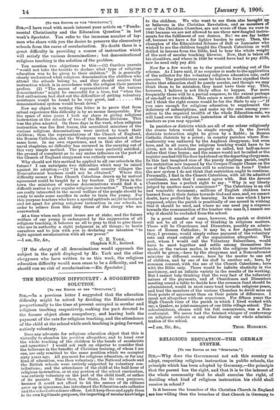[TO THE EDITOR OF THE "SPECTATOR.1 SIB,-4 have read with
much interest your article on "Funda- mental Christianity and the Education Question" in last week's Spectator. You refer to the immense number of lay- men who share with you the desire to preserve the elementary schools from the curse of secularisation. No doubt there is a great difficulty in providing a course of instruction which will satisfy the various denominations ; but denominational religious teaching is the solution of the problem.
You mention two objections to this :—(l) Careless parents "would not take the trouble to declare what type of religious education was to be given to their children." It is generally clearly understood what religious denomination the children who attend the schools belong to, and they should receive that instruction which is in accordance with the religion their parents profess. (2) "The access of representatives of the various denominations" might be successful for a time, but "when the first enthusiasm had died out the difficulties of getting voluntary
assistance would be found to be very great, and the denominational system would break down."
Now my object in writing this letter is to prove that from actual experience this difficulty is by no means insuperable. For the space of nine years I took my share in giving religious instruction at the schools of two of the Marine Divisions. This was the plan adopted. On three days in the week, when religions instruction was the first lesson, the accredited ministers of the various religious denominations were invited to teach their children; thus the representatives of the Church of England, the Roman Catholics, and the Wesleyans were instructed at the same hour. In my own experience, and in that also of other naval chaplains, no difficulty has occurred in the carrying out of this very simple method. The parents were perfectly satisfied ; the ground of complaint as to any undue influence on the part of the Church of England clergyman was entirely removed.
Why should not this method be applied to all our schools in the future ? I can anticipate two difficulties which may be raised against its adoption :—(1) "In the small country villages the Nonconformist teachers could not be obtained." Where this difficulty occurs a Free Church Catechism drawn up by mutual agreement could be taught by a lay teacher. (2) "Even in the town the ministers of various denominations would find it a difficult matter to give regular religious instruction." Those who are really interested in the moral welfare of the people should be ready to make some sacrifice in order to train the young. For this purpose teachers who have a special aptitude might be trained and set apart for giving religious instruction in our schools, in order to relieve from this duty those of the clergy who are overworked.
At a time when such great issues are at stake, and the future welfare of our young is endangered by the suppression of all religious teaching, it behoves us all to pray to God to give those who are in authority a right judgment in all things ; to bestir ourselves and to join with you in declaring our intention "to fight against secularisation with all our power."
Chaplain R.N., Retired.
If the clergy of all denominations would approach the subject in the spirit displayed by Mr. York and the other clergymen who have written to us this week, the religious education difficulty would soon cease to be a difficulty, and we should run no risk of secularisation.—ED. Spectator.]


















































 Previous page
Previous page